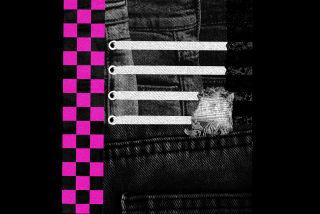Time to Go on the Offensive in an Age of Hurt Feelings
- Share via
What do a sheriff’s academy stripper and the Mission Viejo High School mascot have in common?
Answer: Both provide object lessons in the time-honored practice of offending people. We all know it’s getting easier all the time to hurt someone else’s feelings. What used to require a calculated act of meanness can now be done without trying at all.
“So what?” you might say. The answer is that the art of offending now carries a social stigma that few of us want to bear. It can be a career-buster.
No one is exempt. Now that white males--previously thought impervious to being slighted--have picked up the “We’re Offended” banner in recent months, no group exists that hasn’t complained of someone else’s treatment of it.
So, when it was disclosed last week that someone in the Orange County Sheriff’s Department hired a stripper 2 1/2 years ago to perform at a birthday party at one of its training facilities, reaction was predictable.
At least one women’s group found the incident highly offensive and degrading to women.
Yet, at least two women, one a sheriff’s deputy and the other an academy graduate who saw the show, said they weren’t offended. The latter said, “My thoughts were, it was kind of cute, kind of funny. . . . I don’t feel it was degrading to women as a whole or women police officers.”
Item 2: Last week, Mission Viejo students reinstated a devil as their mascot. The devil’s presence had become controversial over the years after some parents and students considered it offensive on religious grounds, because of what Satan represents.
I trivialized the issue in a column last spring but then heard from people who argued plaintively that I wouldn’t scoff at other religions, so why deride Christians for concern about the devil, who they consider very real?
Chastened, I sought out strongly religious friends. Most understood the readers’ concerns but agreed with me that a devil mascot was no big deal.
Back to square one. Should we require that a school find another mascot because some Christians are offended on important religious grounds?
Can we say with certainty that a stripper’s presence is inherently offensive and, as a result, demand punitive action against the sheriff’s officials who approved her show?
The answers are less clear to me when members in the same group disagree. In other words, why shouldn’t the opinion of women who aren’t offended by the stripper be given the same weight as those who are? Should we accept as gospel that all Christians are offended by the mascot?
In short, is it enough to say that because someone is offended, an act is offensive?
It guides my thinking to consider “offenses” that might be universally agreed upon. The ones that come to mind are Holocaust references for Jews, or something like cross-burnings for blacks. You wouldn’t find split opinions over those actions.
So, yes, I’d argue there are some absolutes.
But I waver in other cases. Women, Christians or white males--just to name a few--are groups so diverse that making sweeping statements about what does or doesn’t offend seem difficult. The National Organization for Women’s chapter president may be offended by a stripper, but the woman who lives down the street may laugh it off.
Perhaps you remember the flap the Atlanta Braves raised over using a simulated tomahawk chop as a rallying technique. Some American Indian groups were offended by the reference to Indians, while others said, in effect, “Aw, just let ‘em play ball.”
When deciding how best to serve society in our reaction to such things, who do we listen to?
Should any of us presume to know how the bulk of women in Orange County would react to the stripper incident? Do we poll everyone before deciding if the action was offensive or not? Should we automatically put more stock in the opinions of spokesmen for organizations?
My yardstick is that “life, liberty and the pursuit of happiness” entitles everyone to go through this world free of personal repression. People should reasonably expect not to be hit with offensive words or behavior, whether from reading the morning paper or from walking down the street.
But I confess to growing confusion as how to put a social definition on just what is offensive, especially when people within the same identifiable groups can’t agree.
As a society we’re mastering the automatic retort of, “You have offended me.”
For me, the vexing question remains of when that is the appropriate response or when the alleged offender is correct in saying, “I’m sorry your feelings are hurt, but have you considered the possibility that you’re just overly sensitive?”
More to Read
Sign up for Essential California
The most important California stories and recommendations in your inbox every morning.
You may occasionally receive promotional content from the Los Angeles Times.













